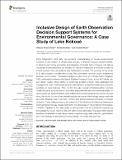| dc.contributor.author | Ovienmhada, Ufuoma | |
| dc.contributor.author | Mouftaou, Fohla | |
| dc.contributor.author | Wood, Danielle Renee | |
| dc.date.accessioned | 2021-10-08T19:06:47Z | |
| dc.date.available | 2021-10-08T19:06:47Z | |
| dc.date.issued | 2021-09 | |
| dc.date.submitted | 2021-05 | |
| dc.identifier.issn | 2624-9553 | |
| dc.identifier.uri | https://hdl.handle.net/1721.1/132918 | |
| dc.description.abstract | Earth Observation (EO) data can enhance understanding of human-environmental systems for the creation of climate data services, or Decision Support Systems (DSS), to improve monitoring, prediction and mitigation of climate harm. However, EO data is not always incorporated into the workflow for decision-makers for a multitude of reasons including awareness, accessibility and collaboration models. The purpose of this study is to demonstrate a collaborative model that addresses historical power imbalances between communities. This paper highlights a case study of a climate harm mitigation DSS collaboration between the Space Enabled Research Group at the MIT Media Lab and Green Keeper Africa (GKA), an enterprise located in Benin. GKA addresses the management of an invasive plant species that threatens ecosystem health and economic activities on Lake Nokoué. They do this through a social entrepreneurship business model that aims to advance both economic empowerment and environmental health. In demonstrating a Space Enabled-GKA collaboration model that advances GKA's business aims, this study first considers several popular service and technology design methods and offer critiques of each method in terms of their ability to address inclusivity in complex systems. These critiques lead to the selection of the Systems Architecture Framework (SAF) as the technology design method for the case study. In the remainder of the paper, the SAF is applied to the case study to demonstrate how the framework coproduces knowledge that would inform a DSS with Earth Observation data. The paper offers several practical considerations and values related to epistemology, data collection, prioritization and methodology for performing inclusive design of climate data services. | en_US |
| dc.publisher | Frontiers Media SA | en_US |
| dc.relation.isversionof | http://dx.doi.org/10.3389/fclim.2021.717418 | en_US |
| dc.rights | Creative Commons Attribution 4.0 International license | en_US |
| dc.rights.uri | https://creativecommons.org/licenses/by/4.0/ | en_US |
| dc.source | Frontiers | en_US |
| dc.title | Inclusive Design of Earth Observation Decision Support Systems for Environmental Governance: A Case Study of Lake Nokoué | en_US |
| dc.type | Article | en_US |
| dc.identifier.citation | Ovienmhada, Ufuoma et al. "Inclusive Design of Earth Observation Decision Support Systems for Environmental Governance: A Case Study of Lake Nokoué." Frontiers in Climate 3 (September 2021): 717418. © 2021 Ovienmhada et al. | en_US |
| dc.contributor.department | Massachusetts Institute of Technology. Media Laboratory | en_US |
| dc.relation.journal | Frontiers in Climate | en_US |
| dc.eprint.version | Final published version | en_US |
| dc.type.uri | http://purl.org/eprint/type/JournalArticle | en_US |
| eprint.status | http://purl.org/eprint/status/PeerReviewed | en_US |
| dspace.date.submission | 2021-09-09T18:22:49Z | |
| mit.journal.volume | 3 | en_US |
| mit.license | PUBLISHER_CC | |
| mit.metadata.status | Complete | en_US |
